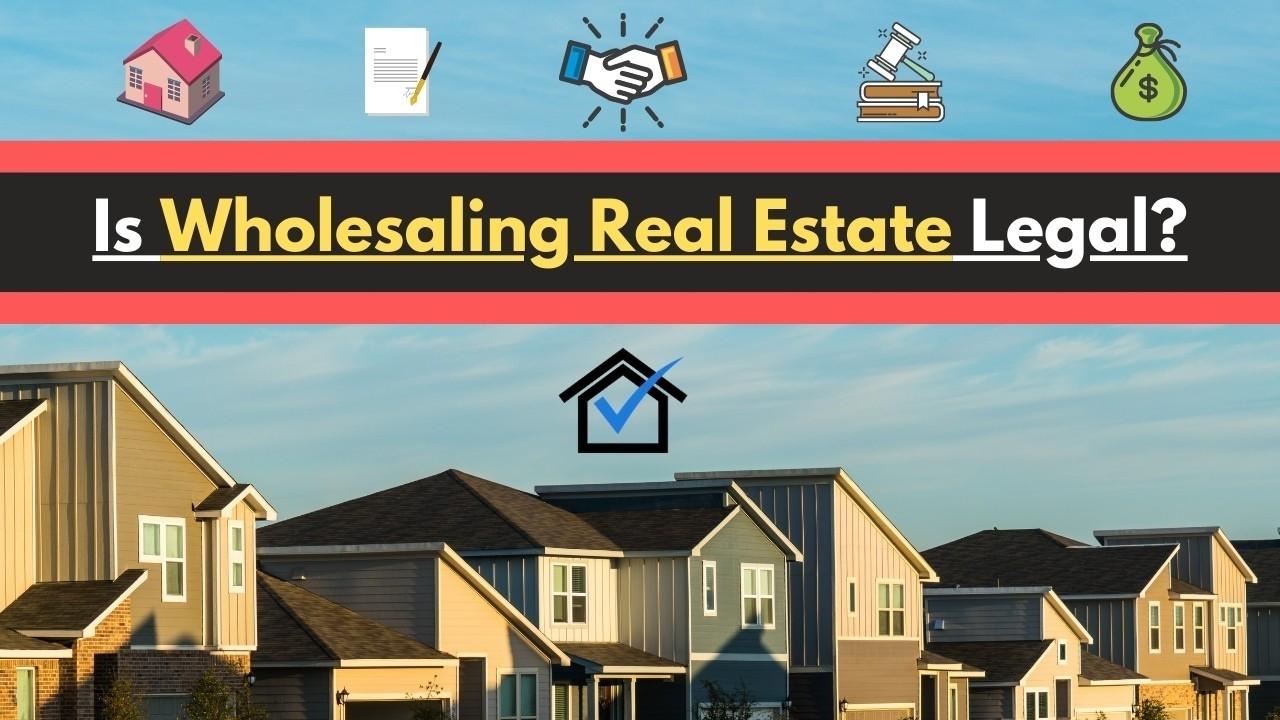Is Real Estate Wholesaling Legal? Comprehensive Guide to Legality, Compliance, and Best Practices

Understanding Real Estate Wholesaling: Concept and Practice
Real estate wholesaling is a popular strategy that allows individuals and investors to earn profits in the property market without purchasing or owning property outright. The core process involves locating a property-often below market value due to distress, required repairs, or the owner’s urgency to sell-and securing it under a purchase contract. The wholesaler then seeks an end buyer, typically an investor, to whom they assign the rights to purchase the property for a fee. This fee, referred to as an assignment fee , is the wholesaler’s profit and usually represents the difference between the original contract price and the price paid by the end buyer. [5] [4]
For example, a wholesaler may contract a property with a seller for $120,000, then find an investor willing to pay $150,000 for that contract. The wholesaler earns $30,000, while the investor gains an opportunity for renovation or resale. [4]
Is Real Estate Wholesaling Legal? The Short Answer
Real estate wholesaling is legal in the United States , but the specifics vary depending on the state in which you operate. [2] At the federal level, wholesaling is largely unregulated, but all transactions must adhere to general real estate laws such as the Real Estate Settlement Procedures Act (RESPA) and, where applicable, the Dodd-Frank Act. The legality at the state level hinges on how wholesalers structure their deals and whether they comply with licensing and disclosure rules. [2]
Some key points to consider:
- States may require wholesalers to make specific disclosures to sellers and buyers.
- In certain jurisdictions, frequent wholesaling activity may require a real estate license. [2]
- Failing to comply with local laws can result in fines, contract voiding, or other legal consequences. [3]
State-by-State Wholesaling Laws: Key Differences
The legal treatment of real estate wholesaling varies significantly by state. Understanding these differences is essential to operating within the law and protecting your business interests.

Source: designfootball.com
Florida
Wholesaling is legal in Florida. Wholesalers do not need a real estate license as long as they are not representing others in real estate transactions. The process hinges on the assignment of contract -the wholesaler sells their equitable interest in the property, not the property itself. Florida law allows for this, but it is crucial to ensure all contracts and disclosures are accurate and transparent. [1]
California
Wholesaling is permitted in California, but the law requires wholesalers to be transparent about their intention to assign the purchase contract. Regular or repeated wholesaling could require a real estate license. Full disclosure to the seller and all parties is mandatory. [2]
Pennsylvania
Pennsylvania now classifies wholesaling as a licensed real estate activity. Anyone engaging in wholesaling must hold a real estate license, and transactions must be overseen by a broker. Selling your own property is excluded, but assigning contracts for a fee without a license is not permitted. [3]
Arizona
Arizona requires wholesalers to disclose their role and intentions to both sellers and buyers. Noncompliance can lead to regulatory action. [2]
Given the diversity of state laws, anyone interested in wholesaling should research their state’s requirements or consult a local real estate attorney for up-to-date, location-specific guidance.

Source: kerelosaissam.github.io
How to Wholesale Real Estate Legally: Step-by-Step Compliance Roadmap
To operate a legal and successful wholesaling business, follow these guidelines:
1. Understand Your State’s Laws and Licensing Rules
Begin by researching your state’s real estate regulations. Some states allow assignment of contracts freely, while others require disclosure, licensing, or both. You can typically find this information on your state’s official real estate commission website or by contacting the Commission directly. If you are unsure, consult a real estate attorney who is experienced in investment transactions.
2. Use Proper Contracts and Clear Disclosures
Always use a purchase agreement that allows for assignment. The contract should state that you, as the buyer, have the right to assign your interest to another party. Additionally, disclose your intentions to both the seller and the end buyer. Full transparency helps avoid misunderstandings and potential legal challenges. [2]
3. Avoid Unlicensed Brokerage Activities
Act only as a principal in the transaction-meaning you are selling or assigning your own contractual rights, not acting on someone else’s behalf. Representing third parties in property sales may be considered unlicensed brokerage, which is illegal in most states. [3]
4. Maintain Accurate Records and Ethical Practices
Keep detailed records of all communications, contracts, disclosures, and assignment agreements. Ethical conduct and transparency protect your business and reputation and can provide crucial evidence if your practices are ever questioned by regulators.
5. Seek Professional Support When Needed
If you are new to wholesaling or unsure about compliance, consider working with a licensed real estate professional or attorney. Many real estate investment associations (REIAs) can provide referrals to experienced professionals in your area.
Practical Example: Legal Wholesaling Transaction
Imagine you find a distressed property listed at $90,000. You negotiate and sign a contract with the seller for $85,000, ensuring your contract includes an assignment clause. You then market your rights to the contract to your network of investors, clearly disclosing that you do not intend to close on the property yourself. An investor agrees to purchase your interest for $95,000. At closing, the investor pays $95,000; the seller receives $85,000, and you receive a $10,000 assignment fee. All parties are aware of the arrangement and have signed the appropriate disclosures. This is a legal wholesale transaction in most states. [4]
Potential Challenges and How to Overcome Them
While wholesaling is legal in many areas, several challenges can arise:
- Changing state laws: Regulations can change quickly. Always stay current by monitoring your state’s real estate commission announcements.
- Unclear disclosures: Failing to fully disclose your intentions can result in rescinded contracts or legal penalties. Always use plain language and written statements.
- Market reputation: Wholesaling can be viewed with skepticism by traditional real estate agents or other investors. Building a reputation for honesty and fair dealing is critical for long-term success.
- Access to buyers: Building a solid network of investors is essential. Consider attending local REIA meetings, networking events, and online forums to connect with potential buyers.
Alternative Approaches to Wholesaling
If wholesaling is heavily restricted or requires licensing in your state, consider these alternatives:
- Double Closing: You actually purchase the property and immediately resell it, usually the same day. This avoids assignment fees but requires more capital and may involve extra closing costs.
- Partnering with Licensed Agents: Team up with a licensed real estate agent to handle assignments or market properties legally.
- Buy and Hold: Invest directly in properties for rental income or long-term appreciation if you are ready to take on ownership.
How to Get Started Legally in Your State
To begin wholesaling real estate in compliance with your state’s laws, follow these steps:
- Research your state’s real estate commission website for specific wholesaling regulations or contact the commission directly.
- Consult a real estate attorney for personalized legal advice, especially if you are new or unsure about local requirements.
- Use contracts that clearly permit assignment and ensure all parties understand and agree to the arrangement.
- Document every step of your transactions, including all communications and disclosures.
- Maintain ongoing education through reputable real estate investment associations, workshops, or seminars.
Key Takeaways
Real estate wholesaling offers a legitimate path to profit in the property market, but its legality depends on strict adherence to state-specific laws, licensing requirements, and full disclosure practices. By understanding your state’s regulations, using clear contracts, and prioritizing transparency, you can build a compliant and successful wholesaling business.
References
- [1] Real Estate Skills (2025). Is Wholesaling Real Estate Legal In Florida?
- [2] Empora Title (2024). Is Wholesaling Real Estate Legal? Your Comprehensive Guide.
- [3] Pennsylvania Association of Realtors (2025). Wholesaling Overview.
- [4] Rocket Mortgage (2023). Wholesale Real Estate: A Beginner’s Guide.
- [5] US Realty Training (2024). What is Real Estate Wholesaling?






